|
|
|
Sort Order |
|
|
|
Items / Page
|
|
|
|
|
|
|
| Srl | Item |
| 1 |
ID:
104114
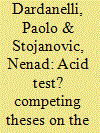

|
|
|
|
|
| Publication |
2011.
|
| Summary/Abstract |
This article deals with the connection between nationality and democracy and explores the role Switzerland plays in the scholarly debate on this question. It identifies three main theses - liberal-nationalist, liberal-multinationalist and liberal-postnationalist - and shows that each of them uses the Swiss case to claim empirical support. It then analyses the connections between nationality and democracy in Switzerland and demonstrates that the country is neither multinational nor postnational, but is best characterised as a mononational state. These findings expose the fallacy of using Switzerland to claim support for either the multinational or the postnational thesis and call for a reconsideration of them. Additionally, they show that "civic nationalism" and "civic republicanism" can be conflated and that a predominantly civic nation is viable and sustainable and is not necessarily an ethnic nation in disguise. The Swiss case thus provides qualified empirical support for the liberal-nationalist thesis.
|
|
|
|
|
|
|
|
|
|
|
|
|
|
|
|
| 2 |
ID:
104110
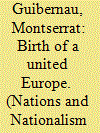

|
|
|
|
|
| Publication |
2011.
|
| Summary/Abstract |
In several respects, the European Union (EU) represents both a novel system of quasi-supranational governance and a novel form of political community or polity. But it is also a relatively fragile construction: it remains a community still in the making with an incipient sense of identity, within which powerful forces are at work. This article has three main aims. Firstly, to analyse the reasons and key ideas that prompted a selected elite to construct a set of institutions and treaties destined to unite European nations in such a way that the mere idea of a 'civil war' among them would become impossible. Secondly, to examine the specific top-down processes that led to the emergence of a united Europe and the subsequent emergence of the EU, thus emphasising the constant distance between the elites and the masses in the development of the European project. Finally, to explain why the EU has generated what I call a 'non-emotional' identity, radically different from the emotionally charged and still prevailing national identities present in its member states.
|
|
|
|
|
|
|
|
|
|
|
|
|
|
|
|
| 3 |
ID:
104106
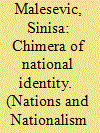

|
|
|
|
|
| Publication |
2011.
|
| Summary/Abstract |
In both popular discourse and many academic works, the existence of national identity is largely taken as given. Although researchers disagree on whether national identities are modern or perennial, and how best to gauge the intensity of identification with a particular nation, there is near unanimity on the view that national identities are real and perceptible entities. In contrast to this view I argue not only that there was no national identity before modernity but also that there is little empirical evidence for the existence of national identities in the modern age either. While it is obvious that many individuals show great affinity for their nations and often express sincere devotion to the 'national cause', none of these are reliable indicators of the existence of a durable, continuous, stable and monolithic entity called 'national identity'. To fully understand the character of popular mobilisation in modernity it is paramount to refocus our attention from the slippery and non-analytical idiom of 'identity' towards well-established sociological concepts such as 'ideology' and 'solidarity'. In particular, the central object of this research becomes the processes through which large-scale social organisations successfully transform earnest micro-solidarity into an all-encompassing nationalist ideology.
|
|
|
|
|
|
|
|
|
|
|
|
|
|
|
|
| 4 |
ID:
104113
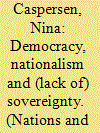

|
|
|
|
|
| Publication |
2011.
|
| Summary/Abstract |
Unrecognised states are among the least likely candidates for democratisation: they tend to be driven by ethno-nationalism, many are marked by the legacy of war and most are facing international isolation. Nevertheless, the claim to democracy has become a central part of their legitimising narrative. This article examines this apparent paradox and finds that neither ethno-nationalism nor non-recognition represents insurmountable barriers to democratisation. However, what we tend to find in these entities is a form of stagnated 'ethnic democratisation'. These findings throw new light on the relationship between democracy and nationalism; they highlight the importance of (lack of) sovereignty; and they are used to evaluate Sammy Smooha's concept of 'ethnic democracy'.
|
|
|
|
|
|
|
|
|
|
|
|
|
|
|
|
| 5 |
ID:
104116
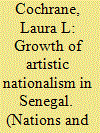

|
|
|
|
|
| Publication |
2011.
|
| Summary/Abstract |
In the 1960s, Senegal's first national leaders narrowly defined how artists should practise nationalism through their work, particularly in the weaving craft, and enforced this definition through selective state patronage. This ideological and stylistic control echoed state control over economic markets. As subsequent administrations have restructured the economy, leading to a powerful informal business sector, so have independent contemporary weavers redefined artistic nationalism. Using ethnographic and archival interviews, this article examines nationalism in Senegalese weaving, placing the perspectives of contemporary weavers alongside those of two arts administrators who helped to develop state-sponsored programmes in the 1960s and 1970s. I argue that contemporary weavers find inspiration from Senegalese nationalism of the mid-twentieth century, yet have modified it to encompass individual expression. Because definitions of artistic nationalism in Senegal have shifted, it remains a significant ideology within the national arts scene.
|
|
|
|
|
|
|
|
|
|
|
|
|
|
|
|
| 6 |
ID:
104108
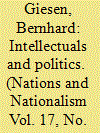

|
|
|
|
|
| Publication |
2011.
|
| Summary/Abstract |
By imagining their audiences, intellectuals invented and constructed the collective identities of nations and transnational communities like Europe or humankind. Four ideal types of intellectuals are outlined by describing them in their relation to politics: the intellectual as cosmopolitan ascetic; the intellectual as enlightened legislator; the intellectual as revolutionary; and the intellectual as the voice of a traumatic memory. These ideal types change over time in response to their focus of attention and their mode of communication. Because of changes in their media (from handwritten to printed books) and changes in their written language (from Latin to French and Italian, and further to vernacular languages), intellectuals were able to change views on past, present and future times. Today, they are involved in (civic) resistance but rarely in politics per se. By renewing the tension of the sacred and profane - the so-called axial-age revolution - contemporary intellectuals in Eastern Europe are decoupled from direct political power.
|
|
|
|
|
|
|
|
|
|
|
|
|
|
|
|
| 7 |
ID:
104121
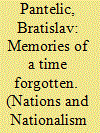

|
|
|
|
|
| Publication |
2011.
|
| Summary/Abstract |
This article questions the persistent view of the Balkans as a place where ethnic and national identities were sustained over centuries of Ottoman and Habsburg rule. It concentrates on the Serbian historical narrative and challenges the picture of the Serbs as an ethnic community who gathered around their bards and priests to cherish memories of their ancient kingdom. Rather, it is argued that we can speak of two competing narratives, one ecclesiastical and the other vernacular, neither of which was even remotely national or historical, and that the Serbs, as we know them today, are not the product of centuries of cultural formation but were carved out of a Slavic mass as were the Croats, relatively recently.
|
|
|
|
|
|
|
|
|
|
|
|
|
|
|
|
| 8 |
ID:
104104
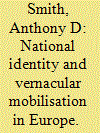

|
|
|
| 9 |
ID:
104102


|
|
|
| 10 |
ID:
104117
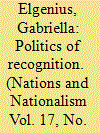

|
|
|
|
|
| Publication |
2011.
|
| Summary/Abstract |
Ceremonial initiatives linked to nation-building projects are highly visible in multiethnic states, where governments seem to have adopted a Durkheimian approach in which ceremonies contribute to the strengthening of communities. However, national ceremonies are not invented or exported to other nations easily, as seen when outlining the pattern of a successful national day. A unifying narrative (sometimes the historical genesis) is significant in the establishment of successful national days, as is the nature of the national day design. The celebrations of the constitution in Norway - and the 77 year struggle to get the Norwegian flag officially recognised - became part of resisting the enforced union with Sweden (1814-1905). Therefore, the growth of Norwegian nationalism must be understood in the context of rival nationalisms in Scandinavia. However, Constitution Day (17 May) has remained a powerful component of Norwegian nationalism long since the constitution ceased to be threatened because of its incorporation in primary and secondary school curricula and, more recently, within the debate on multiculturalism.
|
|
|
|
|
|
|
|
|
|
|
|
|
|
|
|
| 11 |
ID:
104119
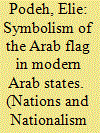

|
|
|
|
|
| Publication |
2011.
|
| Summary/Abstract |
The national flag, anthem and emblem are the three symbols through which an independent country proclaims its identity and sovereignty. Although each state has its distinctive flag, there are similarities in the flags of certain countries, such as in Scandinavia (the cross) and Africa (colours). These symbolise certain propinquity in terms of ideology, culture and history. Similarity is also to be found in the flags of the Arab countries: out of the twenty-two current members of the Arab League, ten share the same colours on their flags (green, white, black and red), while a certain Islamic symbol (eagle, star) in some flags represents the uniqueness of that country. Of the other twelve countries, most rely on one colour of the four (usually red or green) while nine use Islamic symbols (stars, crescent and sword) on their flags. In spite of the importance of this national symbol, the study of the modern Arab flag is almost non-existent. This article explores the modern evolution of the Arab flag and the reasons for the similarities in many Arab flags. In particular, it will deal with the pan-Arab flags of the Hashemites Kingdom of the Hijaz (1916-26), Jordan, Iraq, Palestine, Syria and Egypt.
|
|
|
|
|
|
|
|
|
|
|
|
|
|
|
|
| 12 |
ID:
104111


|
|
|
|
|
| Publication |
2011.
|
| Summary/Abstract |
We argue that historically the official Turkish nationalism and citizenship regime have been marked by an ambiguity that arises from the simultaneous existence of - and repeatedly occurring swings between - the ethno-centric and civic-political understandings of citizenship. We also suggest that the concept of territoriality, which took precedence over other factors in the creation of a new state in 1923, has functioned as a hegemonic reference in the official conceptualisations of the Turkish nation and self. The territorial focus, over time, has been conflated with the ethnic conceptualisations of the nation: both become the underlining elements of the discourse of official nationalism in Turkey, and are utilised in the successive reformulations of citizenship into the 2000s. Through the analysis of schoolbooks and curricula, we further argue that the major oscillations in nationalism nevertheless coincided with the ruptures that characterised the making of modern Turkey: modernisation, democratisation, globalisation and Europeanisation.
|
|
|
|
|
|
|
|
|
|
|
|
|
|
|
|
| 13 |
ID:
104105
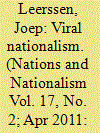

|
|
|
|
|
| Publication |
2011.
|
| Summary/Abstract |
Intellectuals were important to the spread of nationalist ideology in nineteenth-century Europe for a variety of reasons. Firstly, their works facilitated the international spread of the discourse of nationalism; secondly, they mediated between the fields of political institutions and cultural reflection. This article looks at the international mobility and networks of romantic-nationalist intellectuals, and uses the case of August Heinrich Hoffmann von Fallersleben (1798-1874) as an example.
|
|
|
|
|
|
|
|
|
|
|
|
|
|
|
|
|
|
|
|
|